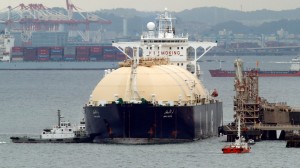From the Article by Jon Hurdle, New Jersey Spotlight News, September 8, 2023
The plan to build New Jersey’s first liquefied natural gas export terminal at Gibbstown on the Delaware River was dealt another blow when a federal agency suspended a rule that would have allowed the fuel to be shipped there by rail. The project has suffered repeated setbacks.
The U.S. Pipeline and Hazardous Materials Safety Administration blocked the Trump-era rule that lifted a long-standing national ban on the transport of LNG by rail. The rule would have allowed the fuel to be shipped by train, as planned by the developer New Fortress Energy, from a town in northeast Pennsylvania to a planned terminal at the Gloucester County town where it would be loaded onto ocean-going tankers and sent overseas.
But the agency last week suspended the rule until it writes a substitute, or until June 30, 2025, whichever comes first.
“PHMSA, in coordination with the Federal Railroad Administration (FRA), is amending the Hazardous Materials Regulations to suspend authorization of liquefied natural gas (LNG) transportation in rail tank cars,” said the agency, a unit of the U.S. Department of Transportation, in the Federal Register.
The decision is the latest blow to the plan, which has been fiercely opposed by activists on the grounds that the highly explosive cargo would endanger public safety in cities such as Camden and Philadelphia through which LNG trains would pass. Critics have also argued that the export of LNG — a super-cooled form of natural gas — would stimulate the production of the fuel from Pennsylvania’s gas-rich Marcellus Shale as the world is trying to wean itself off fossil fuels in an effort to curb climate change.
The suspension follows the agency’s withdrawal in April of a “special permit,” also issued by the Trump administration, which would have allowed LNG to be shipped by rail from Wyalusing, Pennsylvania to Gibbstown only.
Series of obstacles ~ Other setbacks to the project include the failure so far to build a liquefaction plant at Wyalusing where the gas would be converted into a liquid for transportation; and the conspicuous absence of a new terminal, known as Dock 2, at Gibbstown where the export terminal would be built.
Although the Delaware River Basin Commission approved construction of the dock in December 2020, the developer has been subject to restrictions from the U.S. Army Corps of Engineers, which has prevented any construction from March 15 to Sept. 15 each year, when the endangered Atlantic sturgeon migrates and breeds in the river.
New Fortress Energy did not respond to a request for comment on last week’s decision by the federal agency. The company may now have the option of using trucks to ship LNG to Gibbstown, which would require hundreds of truck trips a day around the clock on the approximately 175-mile route, and would itself likely ignite strong opposition in affected communities.
‘People of Pennsylvania and New Jersey living near key rail lines would have faced damage to their health, families, and homes in the event of a derailment.’ — Kimberley Ong, Natural Resources Defense Council attorney
The New Jersey Business and Industry Association, a supporter of natural gas, called the federal decision an “impediment” to the Gibbstown project, and said natural gas and LNG are essential to the world economy.
NJBIA spokesman Ray Cantor said LNG produced in the U.S. has helped Europe meet its energy needs during Russia’s war in Ukraine, and he said the world continues to need fossil fuels while switching toward renewable energy sources. “We must stop imposing ideological policies that ignore the very real world need for fossil fuels,” he said.
Opponents not satisfied ~ The rule suspension was not a surprise given the termination of the “special permit” by the Biden administration, and the decisions make it harder for the project to go ahead. But they don’t necessarily mean it’s dead, said Tracy Carluccio, deputy director of the environmental group Delaware Riverkeeper Network.
“The suspension of the LNG by Rail rule and the denial of their special permit are both nails in New Fortress’s coffin but it is not the ‘stake in the heart’ that kills the project,” Carluccio said.
New Fortress may be waiting to see whether the federal agency, in its new rule, reimposes a permanent ban on shipping LNG by rail, or whether the replacement rule does not fully ban the practice, Carluccio said.
“New Fortress seems to be playing the long game — waiting until they can act but not giving up their basic permits that allow them to build the components of the project,” she said. “That’s why we are not protected from New Fortress using LNG by rail until the final permanent rule is adopted and only then if they fully ban the transport and don’t adopt a halfway measure.”
The Natural Resources Defense Council, a nonprofit that opposes the Gibbstown project, urged U.S. Transportation Secretary Pete Buttigieg to impose a permanent national ban on the shipment of LNG by rail. That decision, it said, would protect some 2 million people along the proposed Wyalusing-Gibbstown route from the risk of a catastrophic explosion.
“People of Pennsylvania and New Jersey living near key rail lines would have faced damage to their health, families and homes in the event of a derailment,” said Kimberley Ong, a senior attorney with NRDC. She said the derailment of a chemical train near East Palestine, Ohio last winter showed the serious consequences of the transportation of hazardous materials.

